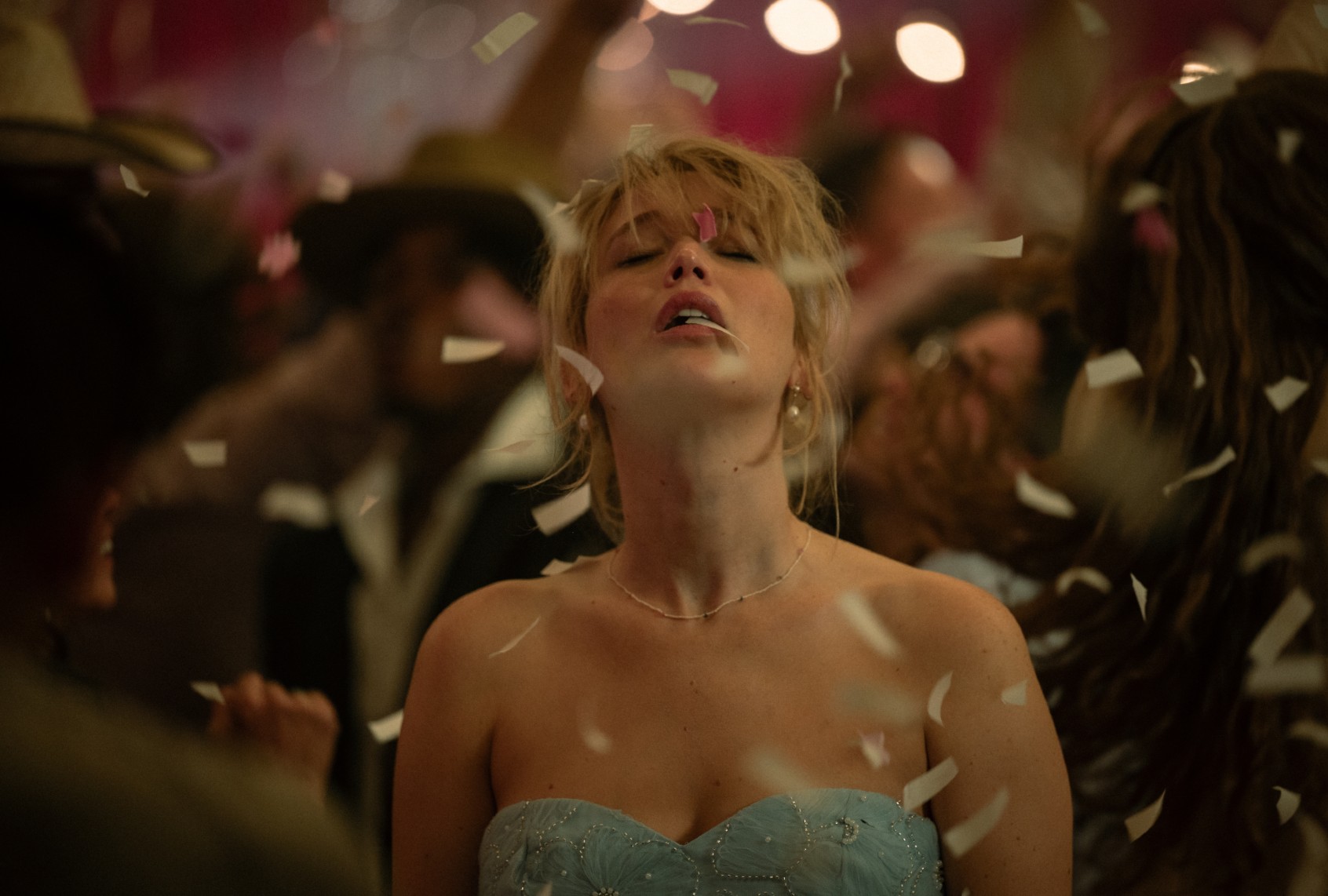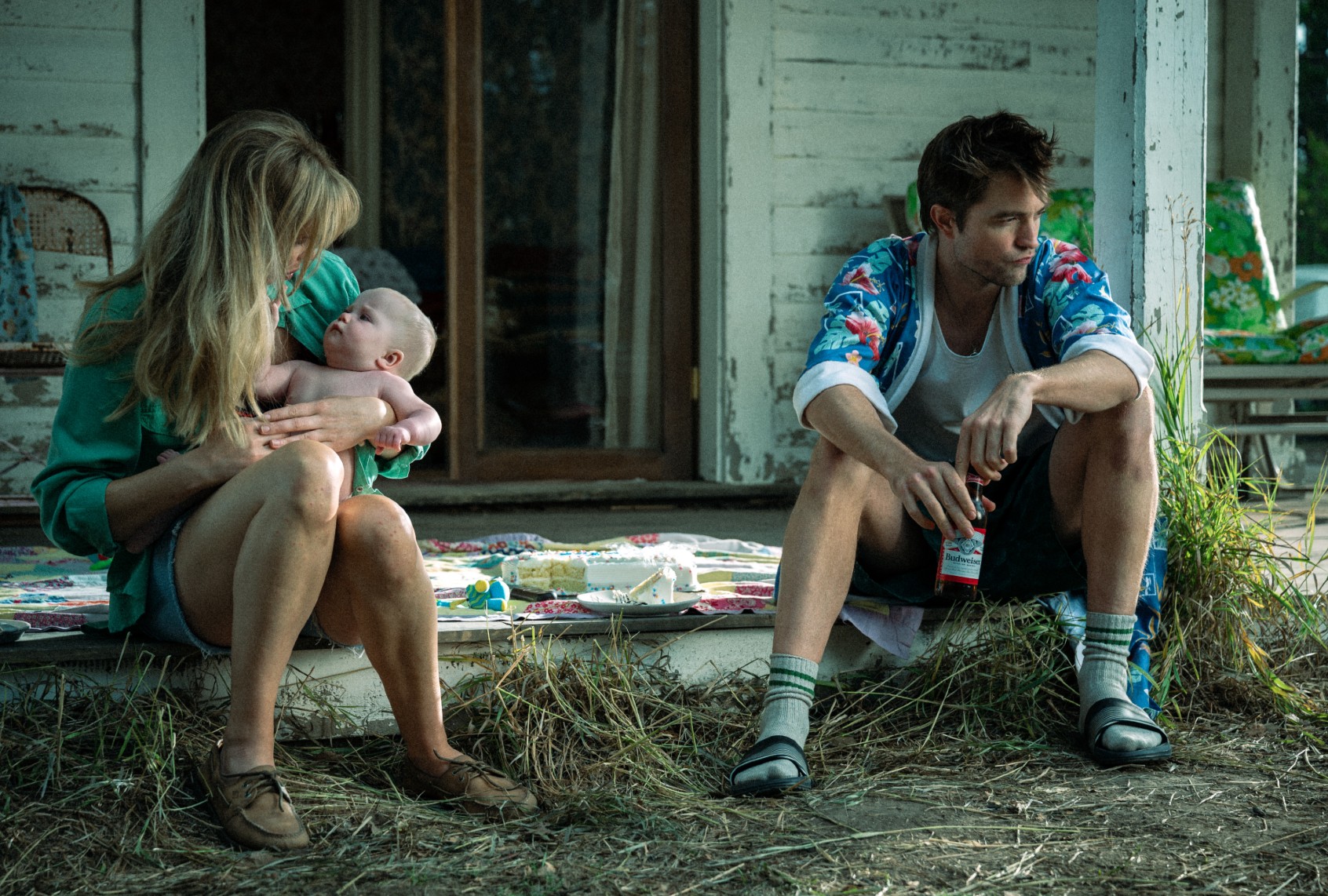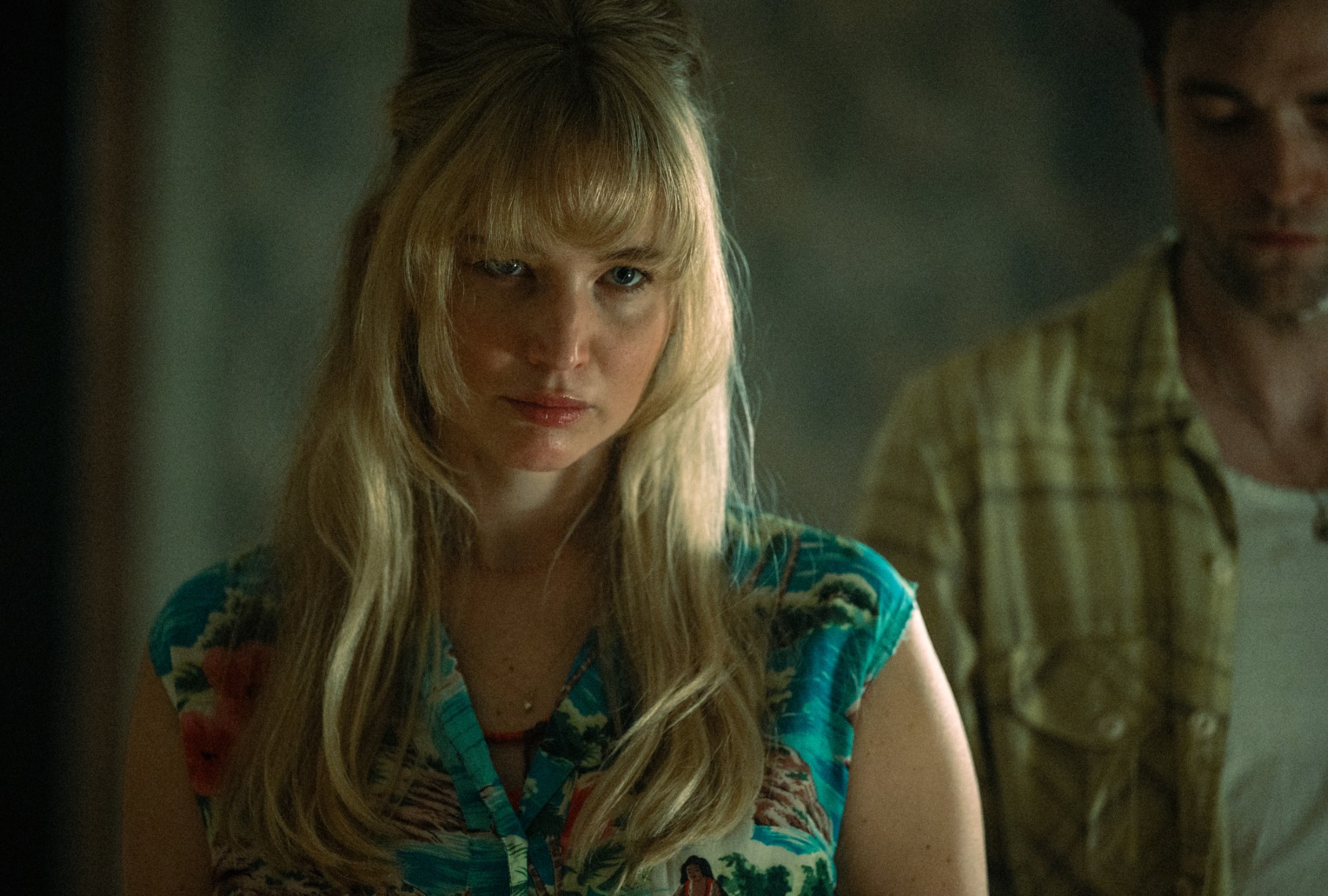Late in Lynne Ramsay’s “Die My Love” — the latest film to mystifyingly leave out a much-needed comma from its title — Jennifer Lawrence’s Grace, a young mother in the throes of post-partum depression, raises a glass. “Live long and die out!” Grace proclaims to a party of onlookers celebrating her return from inpatient psychiatric care. For Grace, this is a declaration of her independence, an admission that she can no longer be the picture of the woman that her husband, Jackson (Robert Pattinson), and the world need her to be. But for the audience, those sentiments more accurately reflect Ramsay’s film, a slow burn that exhausts its welcome and dies in a blaze after losing its grip on a meandering narrative.
The thing about fire, however, is that once it starts to burn, it spreads quickly. Lucky for us, that means there’s plenty of time to behold Lawrence’s ravenous, remarkable performance before “Die My Love” is consumed in the flames sparked by the friction between its screenplay and star. In Grace, Lawrence finds the optimal vehicle for her innate physicality as a performer, tapping into the character’s increasingly beleaguered mindset with tremendous human vulnerability. As she crawls, screams, scratches and sneers, Lawrence maintains a soulful balance between Grace’s creeping delirium and her ceaseless dedication to her newborn son. The dissonance between the two keeps “Die My Love” unpredictable, but the film lives so long in that liminal state that its push-pull ultimately becomes one-note. That Lawrence can make even the film’s most outrageous moments feel earned and, crucially, believable is perhaps one of the greatest credits to her career so far — definitive proof that she’s the rare modern actor whose work elevates a film wholesale.

(Mubi/Kimberley French) Jennifer Lawrence as Grace in “Die My Love”
As rambling as it can be, misinterpreting “Die My Love” as anything other than Lawrence’s is impossible.
That “Die My Love” is among a triad of this fall’s “mother on the verge” resurgence — squeezed between last month’s “If I Had Legs I’d Kick You” and Thanksgiving’s “Hamnet” — doesn’t exactly help its case. There’s a nonzero chance that viewers may be more inclined to analyze and compare “Die My Love” to its thematic acquaintances than they might normally be. And with a star as notable as Lawrence front and center, Ramsay’s film is positioned directly under the microscope’s lens.
It’s a good thing, then, that Lawrence is more than up to the challenge. Despite proving herself as a generational talent in the 2010s and taking home an Oscar in 2013, Lawrence has always been held to impossible standards. Like her similarly talented yet contested contemporary, Kristen Stewart, rising to fame as the star of a franchise of young adult novel adaptations has its disadvantages. Lawrence scored her first Oscar nomination for “Winter’s Bone” at 20 years old, pre-“Hunger Games.” But the woman that people came to know on-screen as the bow-wielding renegade Katniss Everdeen — and off-screen as a goofy straight-shooter — was vilified by the media, discredited for the crime of being herself. Lawrence recently told The New Yorker that she’s come to hesitate doing press for fear of “losing control of her craft,” implying that her words and actions have been twisted in such a way that distracts not just from her work, but the intent behind it.
As rambling as it can be, misinterpreting “Die My Love” as anything other than Lawrence’s is impossible. Like its star, the film shifts and sways with a calculated suspicion, curious yet wary, as if both Ramsay and Lawrence are constantly taking stock of how much the viewer is buying into at any given moment. That’s not to say that the movie feels disingenuous; it’s brimming with earnestness, but fervor can be easily mistaken for fanfare. Ramsay carefully avoids sensationalizing or oversexualizing Grace and Jackson’s relationship at the start of the film. Newly moved into Jackson’s uncle’s home in rural Montana, seeking a reprieve from the hustle of New York City to start a family while Grace writes a novel, the couple begin their new life by giving the rabbits outside a run for their money. They have sex in every room of the house, falling to the ground and staying there all night, making love before making a bed on the floor. It’s the picture of carefree marital bliss, a portrait of free love that evokes the ’70s as much as the gorgeous green-blue hues that envelop each frame of the film, giving “Die My Love” a retro-current look that feels outside of time.
Start your day with essential news from Salon.
Sign up for our free morning newsletter, Crash Course.
Transcending setting and period is key here. “Die My Love” seeks the eternal relevance of a film like “A Woman Under the Influence,” which so achingly portrays a mother’s undying love for her children amidst psychological duress. But unlike John Cassavetes’ classic, Ramsay’s film punches harder and more frequently, inevitably leading to blows that don’t quite land. Just as soon as they’ve settled into their new home, Jackson and Grace have a new infant, a sweet son that Grace cares for more than anything. As the days pass, Grace’s maternal instincts and her human selfishness war. Lust is still present, even overpowering, yet every moment spent masturbating feels like a betrayal of her partner and child. She can’t bring herself to put a single word of her novel on the page. Each sentence is a measure of exactly how much time she sacrificed with her son. During their first Thanksgiving at the house, Jackson’s mother, Pam (Sissy Spacek), tries to provide some relief, but her ailing, alcoholic husband, Harry (Nick Nolte), unwittingly gives Grace the one piece of advice she doesn’t need to hear: “Don’t leave him alone to cry.”

(Mubi/Kimberley French) Jennifer Lawrence as Grace and Robert Pattinson as Jackson in “Die My Love”
Watching Lawrence work is a marvel. She’s one with the ground she’s walking, crawling and writhing on. Grace is a woman of the Earth, a force of nature in the most literal sense.
In interviews promoting the film, Lawrence has spoken candidly about the difficulty of balancing motherhood and career. “Having kids is sacrificial,” she told the New York Times last week. “It feels vain and selfish that I love being a creative person as much as I do. My kids and my family are more important, obviously … but I would not be complete if I couldn’t make movies.” This isn’t exactly far from the kind of inextricability between an actor and their character that typically proliferates early Oscar campaigns. But with Lawrence, someone so known for her authenticity, the connection is genuine, on full display as Grace spends the following months slipping between her personhood and her primal id.
Grace’s increasing intensity is a black hole that absorbs everything and everyone around her. Destruction is the name of her game, even when she doesn’t mean it to be. She’s no longer a difficult woman but a harbinger of wrath. And like Grace bristling against a world not made for her most raw state, Lawrence’s performance opposes the more obvious and outsized elements of Ramsay’s film and its sometimes excessive screenplay, co-written by Ramsay, Enda Walsh and Alice Birch. “Die My Love” is by no means a subtle film, and it’s not trying to be, but there comes a point where the viewer is forced to wrestle with how much they care to watch the almost absurd length of what Grace puts herself through. By the time Lawrence grips her fists into a ball and throws herself through a sliding glass door, we’ve gotten the point: Madness is loud and impulsive, crashing through rationality at a moment’s notice.
We need your help to stay independent
Yet, the film remains seductive despite its near-constant cacophonous antagonism. Without Lawrence, this amiability would be out the window as quickly as Grace. She’s singularly gifted with the ability to oppose the film’s garish elements with a flicker of her eyes, or a cracked half-smile that furtively suggests Grace is still somewhere in there, trying her hardest not to be swallowed by a shadow self. Watching Lawrence work is a marvel. At times, she’ll let her body go slack, hanging down toward the floor while still standing up, as if her figure is a magnet being pulled toward the Earth’s core. Her exhaustion is elemental, something outside of her control.
Grace is stoic yet broken, forcing the viewer to consider Ramsay’s portrait of rural madness — places where it’s easy to lose your mind if you don’t keep proper watch of it — with more goodwill than it ultimately deserves. The barrenness and isolation of the landscape are reflected in Lawrence’s performance, which is why her earthly physicality is so well-matched for the film. She’s one with the ground she’s walking, crawling and writhing on. Grace is a woman of the Earth, a force of nature in the most literal sense. And while Spacek, Pattinson and Nolte all turn in fine performances in an aggravating (if intentionally so) film, no one burns as brightly as Lawrence. Left to her own devices by a pandering script, she alone draws the line where loneliness ends and freedom begins, keeping “Die My Love” from plunging completely into its self-made inferno.
Read more
about this season’s best (and worst) screen performances


